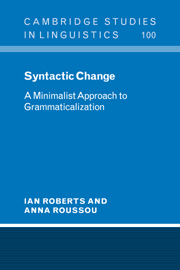5 - Theoretical consequences
Published online by Cambridge University Press: 22 September 2009
Summary
Introduction
In the Introduction and Chapter 1 we provided the theoretical framework that underlies our approach to grammaticalization, focussing on issues pertaining to language change and its relation to acquisition and the nature of parameters. Within this setting we proposed that grammaticalization can be seen as the result of upward reanalysis which affects a subclass of lexical items. As such, its effects in the grammar can be explained and indeed predicted, without at the same time postulating a distinct process or mechanism of change. The empirical evidence for our approach was given in Chapters 2, 3 and 4 where we concentrated on the grammaticalization of T, C, and D elements respectively. Some of the cases we have considered have been treated as typical examples of grammaticalization to the extent that they involve lexical to functional reanalysis (the cases in Chapter 2 for example), while others have not been considered as such, partly because they involve functional to functional reanalysis (e.g. most of the cases in Chapters 3 and 4). In this chapter, we return to the theoretical issues raised in the Introduction and in Chapter 1. Our goal here is to elucidate these as far as possible, in the light of the analyses of the various cases of grammaticalization we have analysed in the preceding three chapters.
We identified three main questions as themes in the Introduction: (i) the ubiquity of grammaticalization – why is this kind of change so common?
- Type
- Chapter
- Information
- Syntactic ChangeA Minimalist Approach to Grammaticalization, pp. 194 - 236Publisher: Cambridge University PressPrint publication year: 2003



